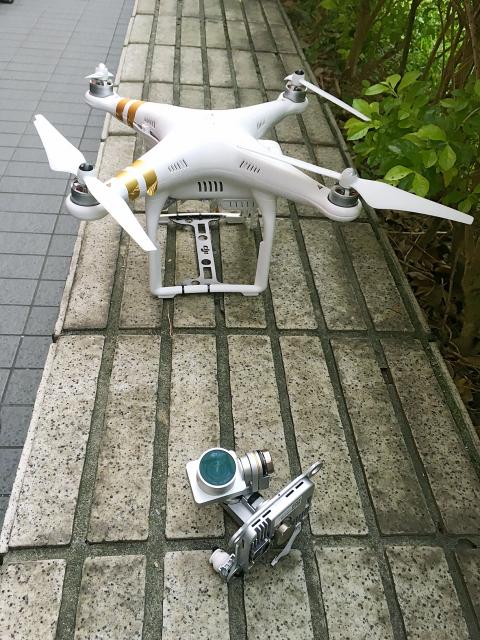Another aerial photography drone crashed into Taipei 101 on Tuesday, further highlighting the dangers that drones pose to public security and privacy.
Since the screening of documentary film Beyond Beauty — Taiwan From Above (看見台灣) many people have purchased photography drones and sought to replicate the scenery in the film.
However, this year Taipei 101 has seen drones hit the building on June 15, June 20 and July 21, Taipei 101 spokesperson Liu Chia-hao (劉家豪) said yesterday, adding that one of the drones dropped within 2m of a pedestrian walking near the building.

Photo: Yao Yueh-hung, Taipei Times
A Taichung resident surnamed Tsai (蔡) is the owner of the drone that hit the skyscraper on Tuesday
Tsai said he had been using the drone while visiting Taipei.
The pedestrian was unharmed and the incident was reported to the police, Liu said, adding that there was concern over a lack of regulations for drones.
The wreckage of the drone was found on both the first floor and the balcony of the 82nd floor, indicating that the drone was flying at least as high as the 82nd floor, Liu said.
The broken pieces have been sent to the Taipei City Police Department to establish if the two parts belong to the same drone, Liu said.
Taipei 101’s management is not authorized to view the footage stored inside the drone and must wait for police to conclude investigations before learning which level of the building the drone had crashed into and whether it caused any damage, Liu said.
In the meantime, the building is also searching for potential damage via its window cleaning crews, Liu said, adding that the footage recovered from the drone would greatly help narrow the search area.
Subsequent action depends on the police investigation and if the building has been damaged, Liu said.
The Aviation Police Bureau said that it would watch any footage after the Taipei City Police Department has concluded its investigations, adding that it would look for any violations of regulations of civic-use aircraft and leave the Taipei City Police Department to determine criminal liabilities.
The department said that according to Article 118 of the Civil Aviation Act (民用航空法), owners of pigeons or flight-capable craft that might interfere with aviation safety could be fined from NT$300,000 to NT$1.5 million (US$9,131 to US$45,653).
The departments said owners of aerial photography drones need to be careful where they are using drones to avoid fines.

Alain Robert, known as the "French Spider-Man," praised Alex Honnold as exceptionally well-prepared after the US climber completed a free solo ascent of Taipei 101 yesterday. Robert said Honnold's ascent of the 508m-tall skyscraper in just more than one-and-a-half hours without using safety ropes or equipment was a remarkable achievement. "This is my life," he said in an interview conducted in French, adding that he liked the feeling of being "on the edge of danger." The 63-year-old Frenchman climbed Taipei 101 using ropes in December 2004, taking about four hours to reach the top. On a one-to-10 scale of difficulty, Robert said Taipei 101

Nipah virus infection is to be officially listed as a category 5 notifiable infectious disease in Taiwan in March, while clinical treatment guidelines are being formulated, the Centers for Disease Control (CDC) said yesterday. With Nipah infections being reported in other countries and considering its relatively high fatality rate, the centers on Jan. 16 announced that it would be listed as a notifiable infectious disease to bolster the nation’s systematic early warning system and increase public awareness, the CDC said. Bangladesh reported four fatal cases last year in separate districts, with three linked to raw date palm sap consumption, CDC Epidemic Intelligence

Taiwanese and US defense groups are collaborating to introduce deployable, semi-autonomous manufacturing systems for drones and components in a boost to the nation’s supply chain resilience. Taiwan’s G-Tech Optroelectronics Corp subsidiary GTOC and the US’ Aerkomm Inc on Friday announced an agreement with fellow US-based Firestorm Lab to adopt the latter’s xCell, a technology featuring 3D printers fitted in 6.1m container units. The systems enable aerial platforms and parts to be produced in high volumes from dispersed nodes capable of rapid redeployment, to minimize the risk of enemy strikes and to meet field requirements, they said. Firestorm chief technology officer Ian Muceus said

MORE FALL: An investigation into one of Xi’s key cronies, part of a broader ‘anti-corruption’ drive, indicates that he might have a deep distrust in the military, an expert said China’s latest military purge underscores systemic risks in its shift from collective leadership to sole rule under Chinese President Xi Jinping (習近平), and could disrupt its chain of command and military capabilities, a national security official said yesterday. If decisionmaking within the Chinese Communist Party has become “irrational” under one-man rule, the Taiwan Strait and the regional situation must be approached with extreme caution, given unforeseen risks, they added. The anonymous official made the remarks as China’s Central Military Commission Vice Chairman Zhang Youxia (張又俠) and Joint Staff Department Chief of Staff Liu Zhenli (劉振立) were reportedly being investigated for suspected “serious